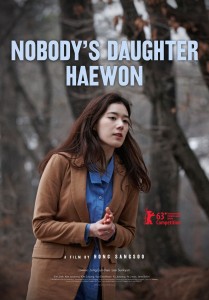
Release Date: TBD
Director: Sang-soo Hong
MPAA Rating: NR
Film Pulse Score: 7/10
A wise person once said that great things come in small packages. Nobodies Daughter Haewon is not only a small package film, but it is at once honest, funny, and delicate. Director Hong Sangsoo’s career has been fruitful so far, and on his 17th film, you can witness the experience of a seasoned director shooting his story with a sense of limitations in the mise-en-scene, and thus giving the playful and rich performances of his actors all the room they need to perform. The tale itself is one that suggests ties with the French New Wave. Not an unfamiliar tag for Hong, he has long been compared to filmmakers Jean-Luc Godard and Eric Rohmer, and the evidence of his own authorship shines through those comparisons.
The films itself seems to have been shot at a series of locations on two separate walks somewhere in South Korea; they are quaint and repeated several times in the film. Haewon first spends a day walking with her mother, something she can’t remember doing. They pass the day in parks, book stores, and tea houses, and Haewon’s initial observations are entertaining. “I was surprised to see that my mother had such a nice backside at her age” was a line that gives the audience a chance to laugh, but also leads into the actual situation. Haewon’s mother is emigrating to Canada for a man. She is leaving her daughter behind.
After one of the most touching scenes between mother and daughter roles I have ever seen (and one of the most honest) we witness the struggle of Haewon to get her life together. The problem in her accomplishing this is only her own indifferent nihilism, like so many French New Wave films, the girl simply doesn’t know what she wants and seems to cause herself, and others, a bit of frustration as a result. This does not move forward in a Hollywood cinema kind of way, and the aesthetic of it all even suggests the opposite: low-fi, small budget, auteur with a capital A.
The professor with whom she holds a tentative relationship carries around a small handheld tape player and has fallen in love with the way it plays Beethoven’s 7th. While other critics have noted its disappointing effect, I would like to point you in the opposite direction. The track accomplishes much more than the symphony in all its glory by first becoming an object that the professor can hold in his hand, something he can use to make this tawdry affair somehow more beautiful. This is something that holds a special meaning, and it’s not hard to mine out the value. The professor, married, tangling himself in a love affair with his student, is trying to capture the object of love, while Haewon herself is too free to ever be contained in such a small box. This film may not be a widespread release, so catch it at the independent theaters in your area when you can. You will be refreshed, touched, and entertained by the sly humor in every situation that makes up this film.






